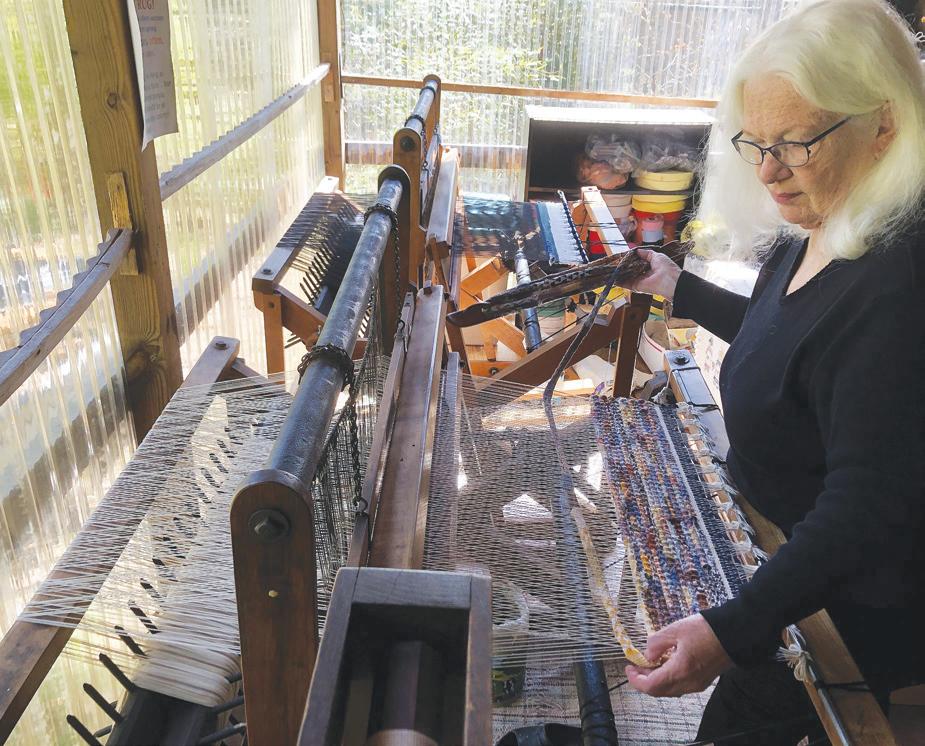
4 minute read
CHRIS & BOB GUSTIN
As winter 2020 waned, the threat of the coronavirus pandemic seemed very far away. Life went on as usual here at Homestead Weaving Studio in southern Brown County, and preparations were being made for April’s Indiana Artisan Marketplace show in Indianapolis.
Suddenly pockets of people infected with the virus began appearing closer to home and everything changed.
With our spring show cancelled, we didn’t know what direction our home business would take. We just planned to “hunker down” and work on some projects around the house. For Bob, that included gathering geodes from the creek, reorganizing closets, and working on his massive CD, record, book, and license plate collections. For me, it meant doing things I usually didn’t have time for, including long-neglected computer work.
By mid-March, local stores had cut hours or offered remote gift shopping, and many finally just closed to adhere to the stay-at-home order from the governor.
We didn’t need much convincing to stay home. We’re in the old-folks high risk category anyway, and since we live a long way from town, we’ve always stocked up on essentials. For once, having freezers and a pantry full of food, and an abundance of toilet paper, paid off. And Corrie, a big-hearted 20-something we’ve known for years, took pity on us and offered to do our shopping,
Orders for our potholder loom kits started to pick up. These kits contain Bob’s handmade wooden looms and stretchy sock loops to weave potholders just like you used to make when you were a kid.
Years ago, I connected with SolMate Socks and began getting “waste” from the factory to cut up and weave into rugs. But some of the socks are good enough to repair. I fix or finish them, and then give away hundreds each year to the local Weekend Backpack program, St. Vincent DePaul, homeless shelters, and other charities.
Sock loops (which are the toe clips created after a knit sock is sewn shut) are an essential part of our kits but require cleaning and sorting to make them usable. The other main part of the kits is a loom, which Bob makes from local poplar wood. We hired Brown County High School’s Eagle Manufacturing to handle one of the many steps involved, the drilling of holes for the pins. Luckily, we got our last batch of looms back from Eagle on the day students began spring break (which has since been extended until next school term). Finishing the looms took us another week.


By late March, it became clear what our business needed to do. We increased the stock of the kits to fill demand from families needing activities at home. We added new items available through our website and Etsy. We found work for my apprentice, Stephanie, which she could do while we practiced wearing masks and social distancing. And we tried to help others.
I decided I could help the facemask shortage by sewing cloth masks and providing them to friends and neighbors who needed them. What I didn’t anticipate was that an item we had in abundance—small stretchy sock loops—turned out to be a solution to an elastic shortage for the others making masks. Some of these cotton loops are rounder than others, and we discovered those work great to hook around your ears for facemasks. The happy accident means we have donated thousands of sock loops for others to use in making masks for personal use and for health care workers.
We also began shipping orders to other weavers in need of yarn and supplies. And we somehow found time to weave and work in the garden. We used the phone to stay in touch with our daughter in Hawaii and our son in Minnesota. Along the way, we took some time to listen to John Prine. He died in April after being infected with the coronavirus, and his music meant a lot to us. We’ve been married for more than 47 years, but we’ve loved his music for even longer than that.
Growing more of our own food seemed like the thing to do when daffodils announced that spring, indeed, would come as usual. Bob prepared the garden beds and I planted seeds in the greenhouse. The peace and centering I found while planting gave me hope for the future. If this seed, the size of a pinpoint, can grow into a beautiful petunia, our country can get through this scary time.
Some of the seeds I planted this spring were way past their prime, some even dating back to the 1990s. While I was tempted to throw them out, something in me wanted to give them a chance. Maybe they’ve just been waiting for that. Maybe that’s what we’re all waiting for—a chance to show that we’re better than we thought we were, better than other people thought we were. Now is the time that we need to help each other. In a way, that is creating, too. Creating friendships, community, family.
It reminds us of the saying which stems from the first century philosopher Hillel the Elder, but has lately been attributed to everyone from Malcolm X to Mikael Gorbachev to Emma Watson:
“If not me, who? If not now, when?”









